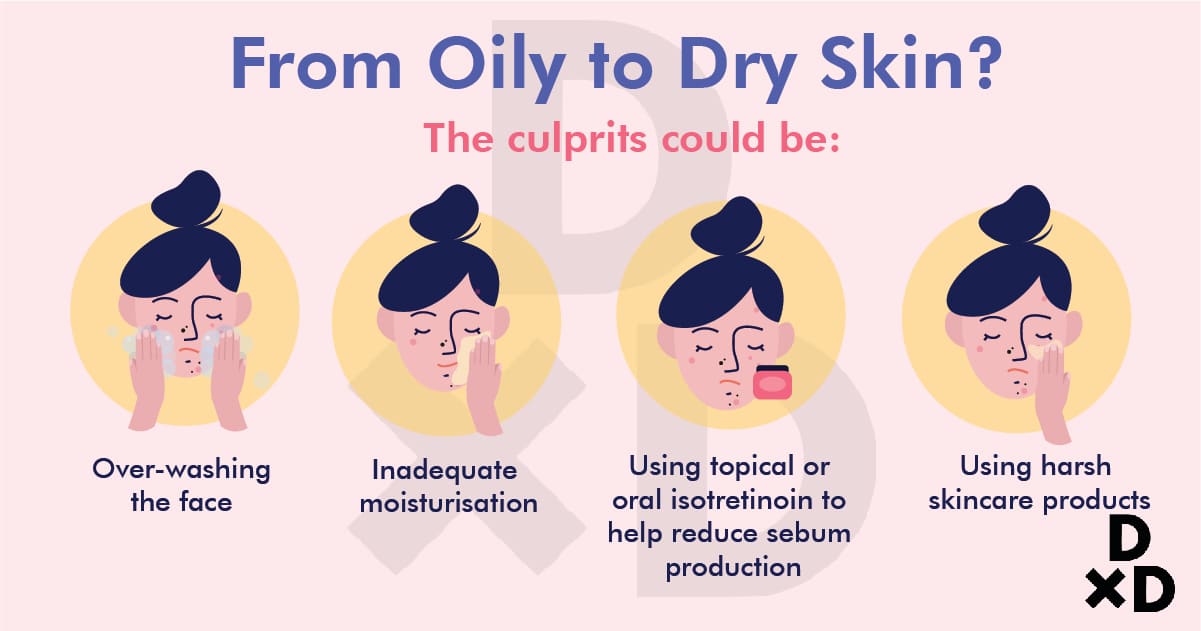Zits, pimples, blemishes and bumps—these are just a few of the many names for acne. Acne can affect anyone, regardless of age, ethnicity and gender, causing discomfort and self-consciousness. About 4 out of every 5 people have outbreaks at some point in life [1][2].
Acne is a skin disease that is very common in teenagers and young adults. The face, back, chest and shoulders are common areas for breakouts [3]. In this article, I will be sharing with you:
- What causes acne outbreaks
- Who is more prone to acne
- Which acne treatment is more suitable
- How to prevent acne
Read on to find out more!
What is acne?
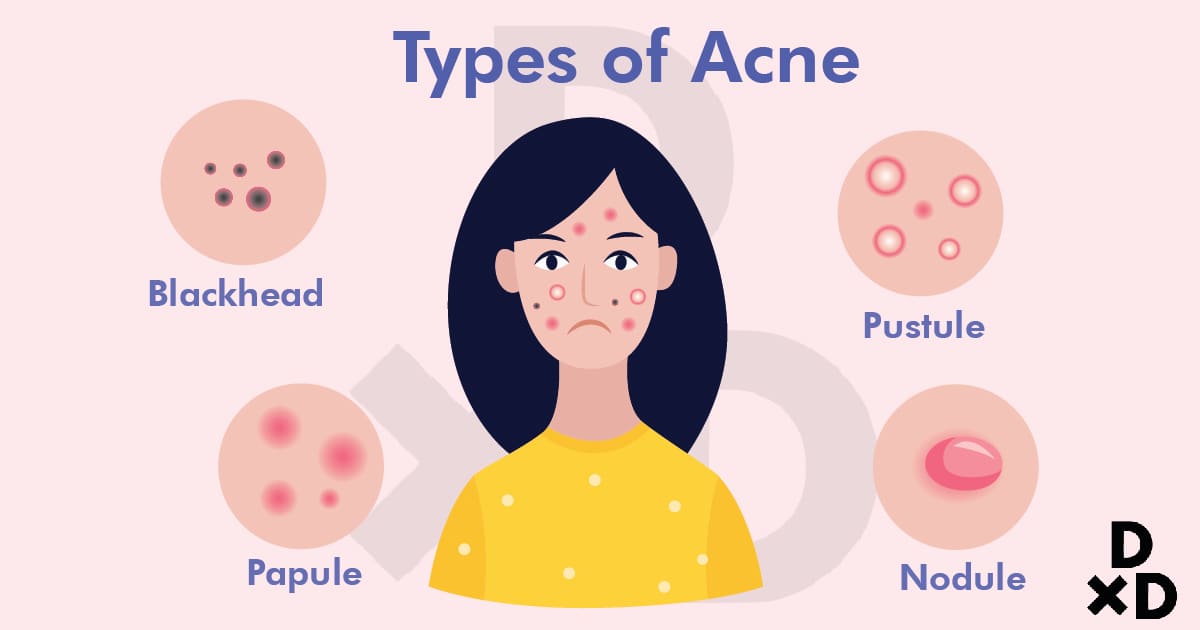
Acne and pimples are often used interchangeably by most patients. However, the difference between the two is that acne is a disease while pimples are one of its symptoms. Acne refers to the inflammation of oil glands in our skin and may present as pimples in the form of:
- papules,
- pustules,
- nodules and
- cysts.
You may have also heard of comedonal acne. It can be the prelude of an acne outbreak for some people. For a pimple (or many pimples) to form, it needs to have the right conditions. In the case of pimples, you need to have clogged pores, which often present as comedones such as:
- blackheads and
- whiteheads [4].
Whiteheads occur when the pores in our skin become clogged with dead skin and form small yellowish or white plugs. When these are opened and exposed to air and dirt, they become blackheads. Inflammatory process starts when you have:
- comedones,
- excessive sebum and
- bacteria
With those, you may start to develop an acne outbreak.
What factors affect acne outbreaks?
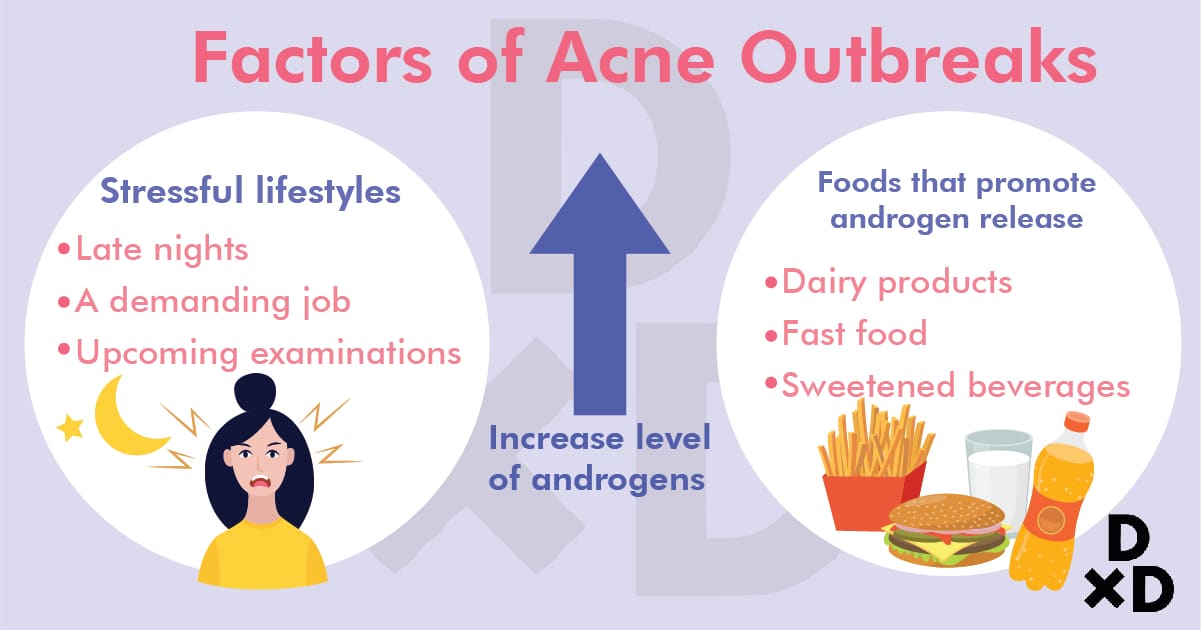
When patients come in to seek treatment, most already have some suspicion as to what is causing their acne, such as:
- an upcoming examination
- a stressful job
- unsuitable skincare products
- certain foods
To me, it is important to address your beliefs and concerns and at the same time explain to you how they are relevant to your condition.
Scientific research has indicated that the root cause of acne is due to the overactivity of male hormones in our bodies [5]. Ladies have male hormones too! The rise of these male hormones (androgens) triggers a surge in sebum production in your skin [6].
These hormonal changes are commonly influenced by your genes, lifestyle and even certain foods. Some of us are just prone to having acne because of genetics. The level of androgens can rise due to stressful lifestyles such as:
- frequent late nights,
- a demanding job or
- upcoming examinations.
Recent studies have also shown that some foods can promote the release of androgen in our bodies [7] [8]. High glycemic index (GI) foods include:
- dairy products,
- fast foods and
- sweetened beverages.
Glycaemic Index
The GI is a measurement of how quickly a food causes our blood glucose levels to rise. Foods with a high GI are quickly digested and absorbed. When your glucose levels are high, it can cause you to experience [9]:
- losing your eyesight,
- kidney failure
- an increase in cardiovascular risk.
Read more: The Ultimate Guide to Cardiovascular Risk Reduction (2020)!
Therefore, you should always choose food with a low GI. [14]
Glycaemic Index (GI):
Rating:
Examples of food:
Low
Less than 55
- beans,
- pasta,
- milk,
- dates,
- apple,
- orange,
- sweet potato,
- chickpeas,
- yoghurt.
Medium
From 55 to 70
- honey,
- orange juice,
- porridges,
- couscous,
- basmati rice,
- wheatmeal biscuits,
- rockmelon,
- pineapple
High
More than 70
- bread (low GI types are available),
- corn flakes
- brown rice,
- sticky rice,
- congee,
- corn pasta,
- watermelon,
- lychee,
- potatoes,
- rice milk,
- rice crisps
Who is most prone to an acne outbreak?
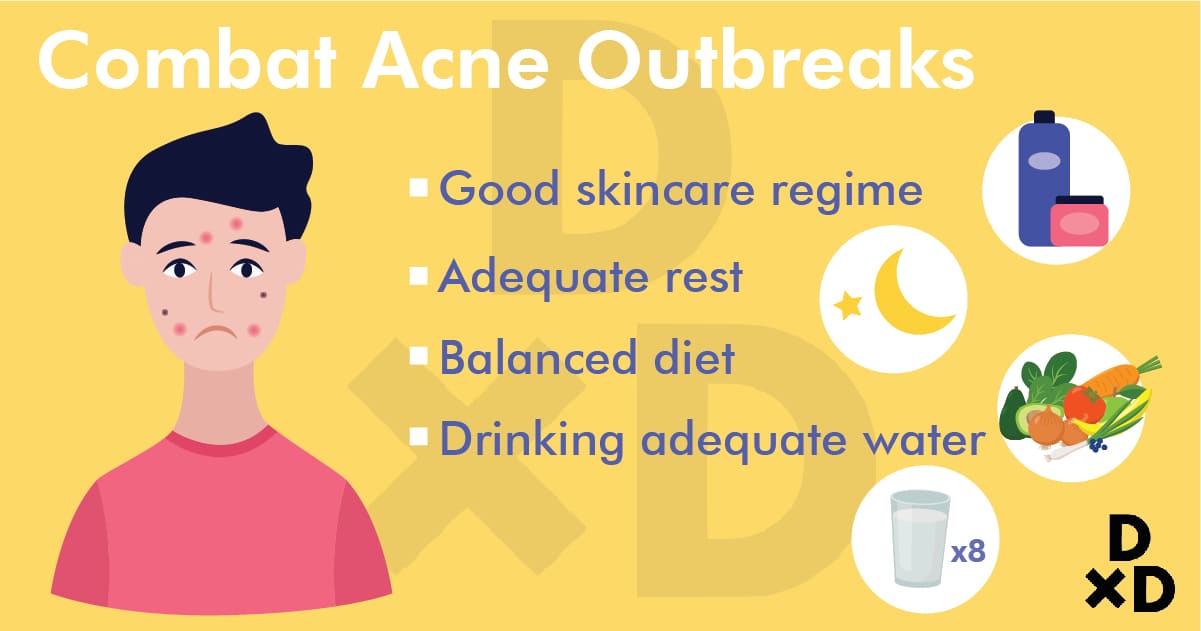
I would say anyone can experience an outbreak if you don’t take care of yourself!
Even with good genes, you need to adopt a good skincare regime. This will help you manage factors that predispose you to an acne outbreak. It includes regular cleansing to reduce the daily buildup of:
- dead skin,
- clogged pores and
- excess sebum.
Besides that, adequate rest and a balanced diet will help you to achieve blemish-free skin. Drinking eight glasses of water daily will also keep you hydrated, giving your skin a healthy boost. Yes, that is approximately 2 litres a day! You should always get a consultation with a doctor to find out what causes your breakouts.
"I don't have oily skin, so I'm safe from acne, right?"
This is a common misconception. Although oily skin is associated with acne, patients with dry or sensitive skin can have acne as well.
Patients who have oily skin may develop dry skin over time. The culprits could be:
- over-washing their faces,
- using harsh skin care products,
- inadequate moisturisation,
- using topical or oral isotretinoin to help reduce sebum production [10].
There are many reasons why you may have dry skin and acne. Thus, an evaluation of your history is important. Some patients may also have concomitant eczema or other skin issues which will complicate acne treatment.
Can acne be a sign of something more serious?
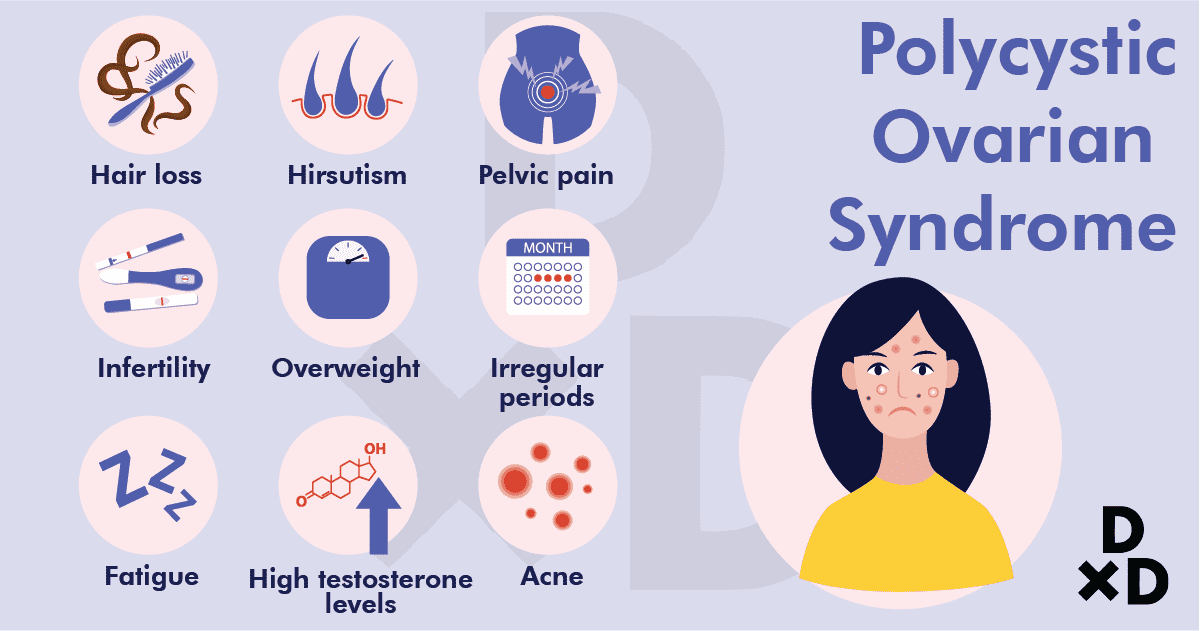
Sadly, yes. Some females who present with acne may have this condition called polycystic ovarian syndrome (PCOS). The worse part? They may not be aware of it. Due to excess androgen levels in their body, they often have:
- irregular periods,
- unwanted hair growth and
- acne outbreaks.
Be sure to see a gynaecologist if you suspect you have symptoms of polycystic ovarian syndrome. An ultrasound scan will help to confirm the diagnosis.
Which acne treatment is suitable for me?
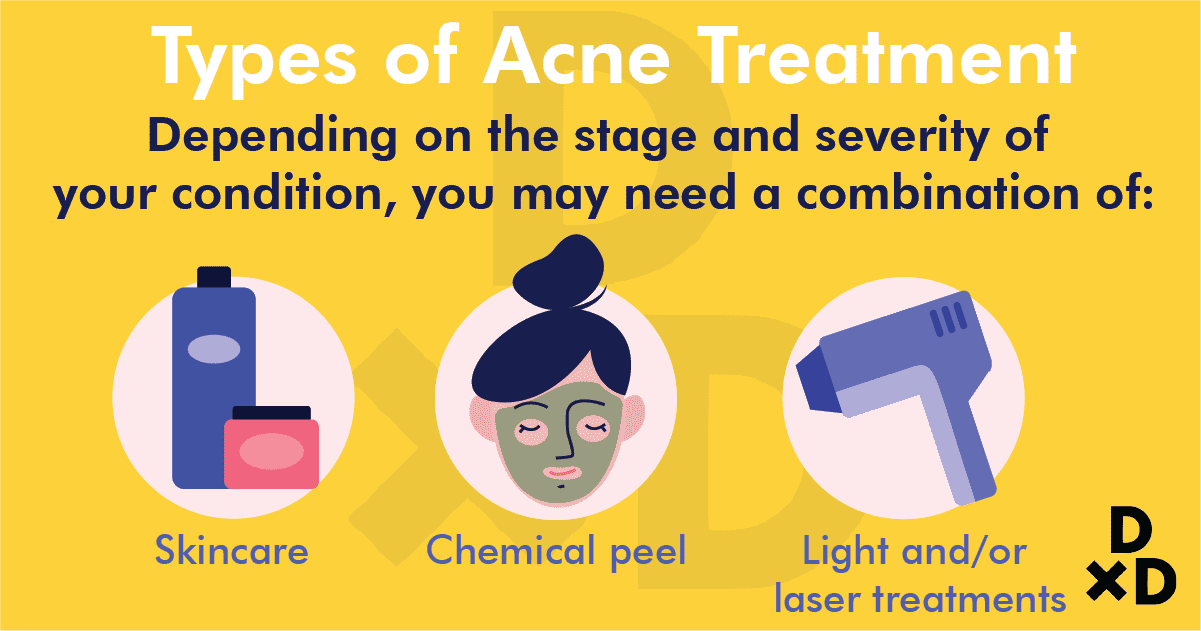
There are many factors that I consider to determine which treatment will be the most suitable for you. That is why I prefer a detailed approach to assess your suitability. With that, I can find out which treatment you have tried works for you and which does not.
Depending on the stage and severity of your condition, you may need a combination of:
- skincare,
- chemical peel,
- light and/or laser treatments.
Acne medications may even be required if inflamed pimples with pus or enlarged cysts appear. It will help to prevent the formation of more scars. I also advise that you get treatment for existing acne scars as early as possible. These scars may become harder to treat in the future.
Skincare
As a rule of thumb, I will start you off on an appropriate skincare regime. It should address the most important aspects of acne:
- reduce sebum production,
- get rid of clogged pores and
- reduce the acne-causing bacteria on your skin.
Not all face wash is formulated for acne-prone skin; some can be too harsh while a gentle face wash may not unclog pores effectively. A suitable facewash for acne should contain ingredients such as:
- glycolic acid,
- salicylic acid,
- and lactic acid.
In short, these acids help to exfoliate dead and unhealthy skin to promote skin renewal, decongest pores and reduce sebum.
Once the skin is cleansed, you should follow up with a nourishing serum. It should contain Allantoin, an ingredient that hydrates the skin, removes materials from clogged pores and neutralises infection-causing toxins at the same time.
Adjuvant treatments
This may include:
- oral medications,
- chemical peels,
- laser/light treatments.
A chemical peel, especially no downtime doctor-grade peel, exfoliates the skin at a deeper level. It will slough away the unhealthy layer of skin on top to promote the renewal of healthy skin. Thus, it ensures that pores are thoroughly cleansed of grime and sebum.
Lasers such as the Long Pulsed laser combined with blue low-level laser light can be prescribed, depending on the condition. They can be used to:
- destroy overactive sebaceous glands,
- reduce acne inflammation,
- kill acne-causing bacteria and
- control oil secretion.
These acne treatments are prescribed as a standalone treatment or as a combination and in sequence. Hence, it will greatly help to control and treat acne.
When is acne considered too severe?
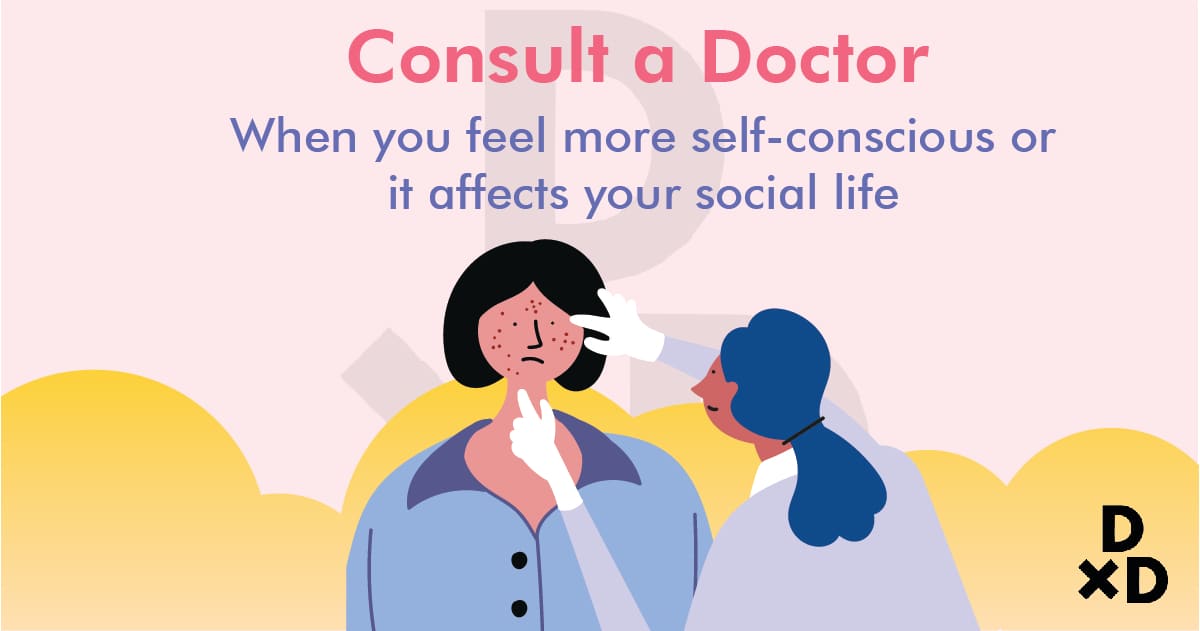
A person who does not usually have pimples will consider his/her acne condition to be severe even if there are only a few pimples. Likewise, someone who has been having acne for years may tell you that his/her condition is not serious.
You should consult a doctor when:
- you feel more self-conscious or
- it affects your social life (e.g. making new friends or job opportunities).
Pimples should be treated early to reduce the chances of permanent scars on your face. They can become more difficult to treat later on.
Aesthetic doctors and skin specialists in Singapore have at their disposal a range of therapies and medical devices that are targeted at acne and scars. They can treat the problem at different stages. These range from:
- creams,
- medications,
- skincare products,
- no downtime chemical peels and masks,
- acne facials,
- lasers and light therapies.
That is why any time is a good time to consult a doctor! It all depends on when you feel you need help. We have a variety of therapies to address the issues, even if you are new to the problem or have tried other treatments.
Off-the-shelf vs professional treatments
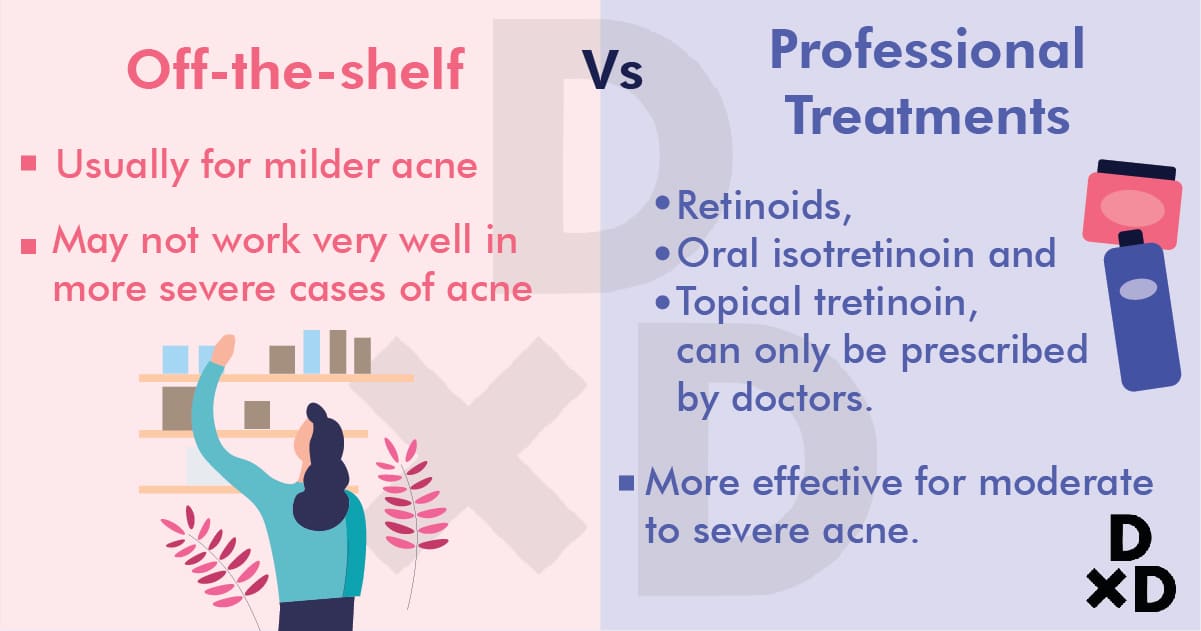
Many patients experiment with off-the-shelf acne products or try home remedies. They would usually see if they will work for them before seeking advanced medical treatment. They may work if the acne is mild and responsive to such treatments.
However, off-the-shelf products may not work very well in more severe cases of acne. Sometimes, what works well for your friend may not work very well for you. Everyone's skin condition and its response to treatment are different.
Generally speaking, off-the-shelf products cater to usage by most consumers. Thus, the ingredients have to be milder. Professional acne treatments contain more potent ingredients - more effective for moderate to severe acne. That is why they should be used under medical supervision.
For instance, other than the ingredients I mentioned earlier (e.g. salicylic acid and Allantoin), retinoids are effective at treating acne. It also prevents the formation of acne scars. But retinoids, like oral isotretinoin and topical tretinoin, can only be prescribed by doctors and are not available off-the-shelf.
I use acne creams often, but do I still need professional treatment?
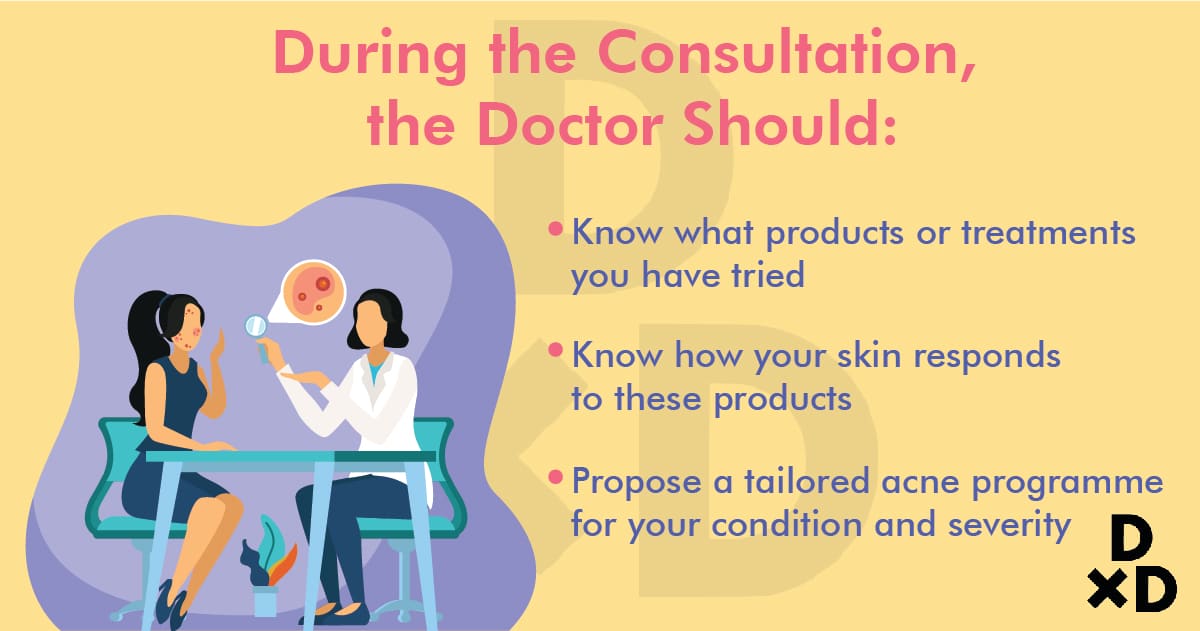
Without knowing the severity of the acne or the type of cream you are currently using, it will be difficult to answer. Surely, there are many types of acne creams out there.
If you have acne-prone skin and the products are not working for you, indeed you should seek help from a medical professional to get it treated. During the consultation, the doctor should get to know:
- what products or treatments you have tried,
- how your skin responds to these products and
- propose a tailored acne programme for your condition and severity.
Sometimes, the doctor may also prescribe a short course of oral treatment to help you clear the acne faster.
Why is popping zits never a good idea?
It depends on what type of zits you are dealing with in particular. Most doctors will not encourage patients to pop their zits on their own. There are two reasons for this.
Firstly, you could be using your bare hands, fingers or contaminated instruments. This may transfer bacteria to the already inflamed pimple, thus, causing it to be further infected.
Secondly, if you are prone to scarring, extracting on your own may result in more unwanted scars. Furthermore, large acnes have an increased chance of scarring.
How to prevent acne?
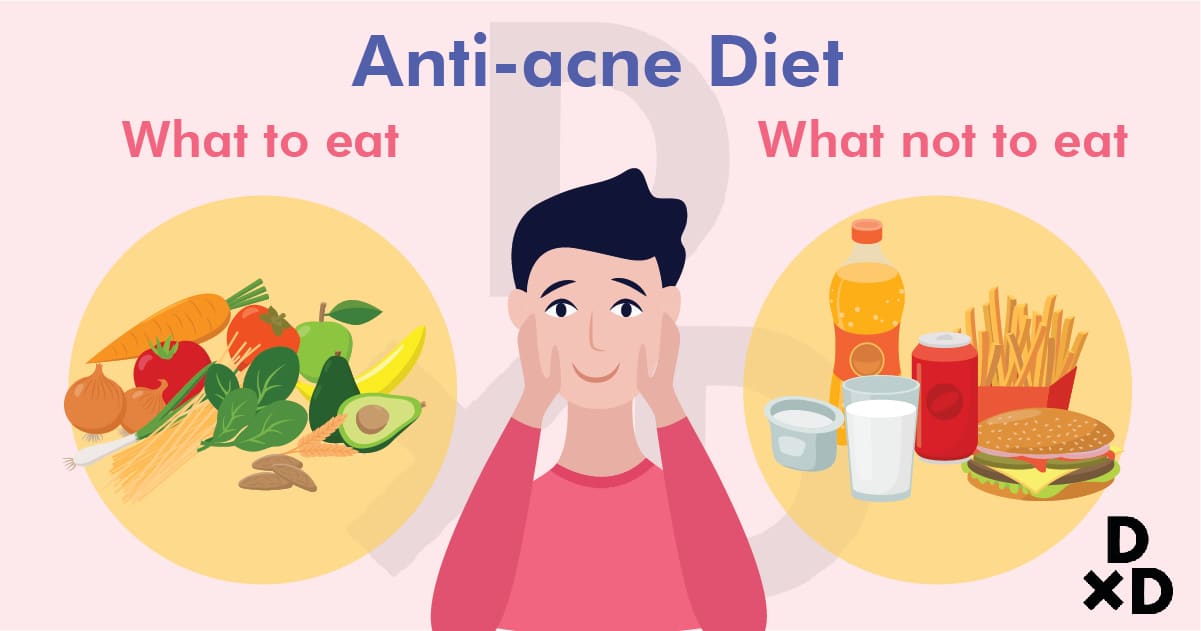
Above all, an effective skincare routine to get rid of excess sebum and dead skin cells is a good starting point. If you are done wearing make-up, you should wash it off completely with an effective make-up cleanser. Generally, make-ups labelled as “non-comedogenic” are safer for those prone to acne breakouts [11]. Thus, I would encourage you to look up for this type of make-up.
If you have a habit of touching your face, try to avoid doing so. This may transfer bacteria from your hands to your face [12]. Likewise, using hair gels and pomades may cause pimples to develop along the hairline. These products may clog the skin pores, thus causing pimples to form. Therefore, you may want to cut down on such hair products if you are affected by it.
As mentioned above, you should consume a diet which consists of fruits and vegetables. Cutting down on foods that have a high GI may help to reduce acne outbreaks:
- dairy products [13],
- fast foods and
- sweetened beverages.
Stress and late nights are also known triggers for acne. Finally, you should:
- rest early at night and
- look for solutions to reduce stress in your daily life.
This may help with reducing the level of androgens in your body.
You know yourself best, but a doctor knows more
If your skin condition is affecting your life, maybe it is about time to make a change. There are many varieties of treatments available for different types of acne as well as conditions. When in doubt, you should always consult a doctor to find a suitable treatment for yourself!
Also read the guide to Mummy Makeover in Singapore
Halley Medical Aesthetics' mission is to help customers achieve beautiful, desirable and unforgettable appearances. They wholeheartedly deliver optimal treatments for each and every patient because Halley Medical Aesthetics is passionate about unveiling a beautiful and confident you inside and out
Ask Dr Terence Tan medical questions here.


